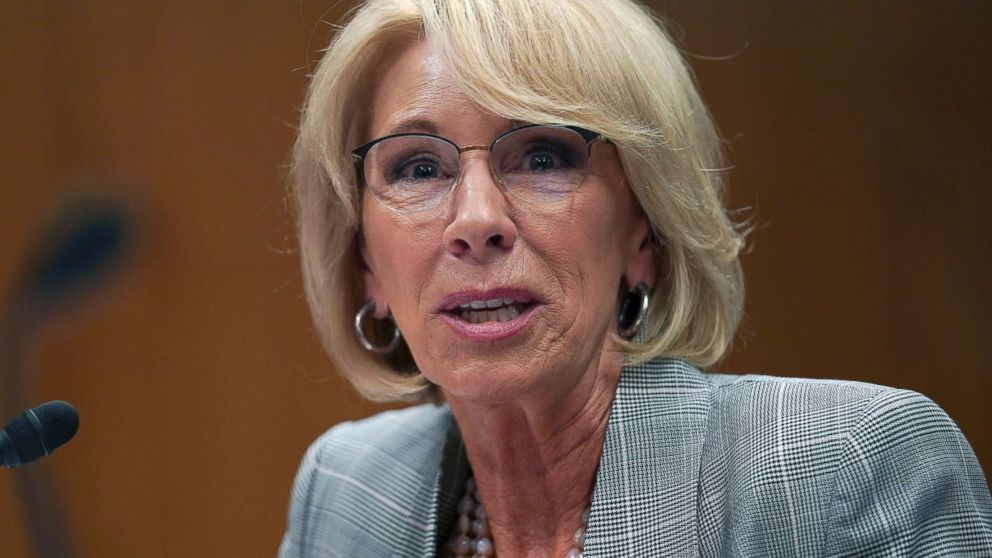Lawmakers demand review of Education Department ethics program after former for-profit college exec shapes policy: EXCLUSIVE
Two Democrats are demanding a review of the Education Department's ethics program following an ABC News report that revealed a senior Education official, hired straight out of the for-profit college sector, helped dismantle regulations designed to protect students defrauded by predatory colleges.
Sen. Elizabeth Warren, a Massachusetts Democrat, and Rep. Raja Krishnamoorthi, a Democrat from Illinois, make the demand in a letter sent to the department's inspector general Thursday.
Robert Eitel, who was hired by the Trump administration last year after four years as a for-profit college executive, played a role in suspending an Obama-era policy known as "borrower defense to repayment," according to documents obtained exclusively by ABC through the watchdog group Democracy Forward.
The borrower defense rule made it easier for students, enticed into taking out pricey loans based on fraudulent claims by for for-profit colleges, to file for debt relief. It also allowed the government to recoup losses due to discharged loans from predatory schools.
When the Department decided to suspend the rule, Eitel – a former VP at for-profit college operators Bridgepoint Education and Career Education Corp. – circulated borrower defense talking points to staffers, edited background documents, and even signed off on the official delay notice, the documents obtained by ABC showed.
Publicly, DeVos asserted that under the rule, "all one had to do was raise his or her hands to be entitled to so-called free money."
After Trump took office, the borrower defense unit had been instructed "not to submit additional claims for approval... because borrower defense policies are being reviewed with the change in administrations." Just before the regulations would have kicked in, Devos officially, indefinitely pressed pause, and the Education Department is currently in the midst of writing "new regulation that will treat students, institutions, and taxpayers fairly."
Until ABC's report, Eitel had refused to tell lawmakers whether he'd had a hand in the delay.
"A May 2018 report by ABC News revealed that Mr. Eitel played a more central role than previously indicated in the Department’s decision to delay the enforcement of borrower defense and gainful employment, and raised questions about whether key Department officials have provided full and complete information to Congress," Warren and Krishnamoorthi wrote in the letter to the Education Department's inspector general.
Ethics laws forbid Eitel from working on "particular matter involving specific parties that are directly and substantially related to former employers."
But according to documents cited by Warren, agency ethics officials advised Eitel that delaying the borrower defense rule – which his former employers acknowledged in SEC filings last March could affect their bottom line – could not be considered a "particular matter," because it is "directed to the interests of a large and diverse group of persons."
He was therefore free to be involved on borrower defense policy, as long as he didn't participate in the adjudication of claims filed against his former employers, the ethics office said.
"We disagree," Warren and Krishnamoorthi wrote in their letter to the inspector general. The rule applies "only to institutions of higher education that participate in the federal student aid program" and is thus considered a particular matter, they said.
"We are deeply troubled that Mr. Eitel’s questionable compliance with federal ethics rules ... signal a critical breakdown in federal ethics at the Department of Education," Warren and Krishnamoorthi wrote.
The lawmakers also questioned Eitel's possible involvement in the rollback of the so-called "gainful employment" rule, another Obama-era regulation which penalizes institutions with unreasonably high debt-to-earnings ratios.
Eitel claimed he had "voluntarily recused myself" from matters related to gainful employment, "regardless of whether the ethics rules required such a refusal."
But in the letter to the inspector general, the lawmakers question whether he actually did so, citing emails organizing meetings on the topic in question.
They have asked the office to inspect Eitel's involvement in both the gainful employment and borrower defense rules, to "provide clarity on what constitutes a legitimate and full 'recusal.'"
More broadly, they asked the inspector general to "examine the Department of Education's entire federal ethics program to determine if it ensures department employees are 'observing both the letter and spirit of the ethics laws and regulations."
"I take seriously my ethical obligations and have meticulously followed the ethics guidance that I have received from the Department’s Office of the General Counsel," Eitel said in written testimony to Congress obtained by ABC News. "I have gone above and beyond my ethics obligations."
The Department of Education did not immediately respond to ABC News' request for comment.




